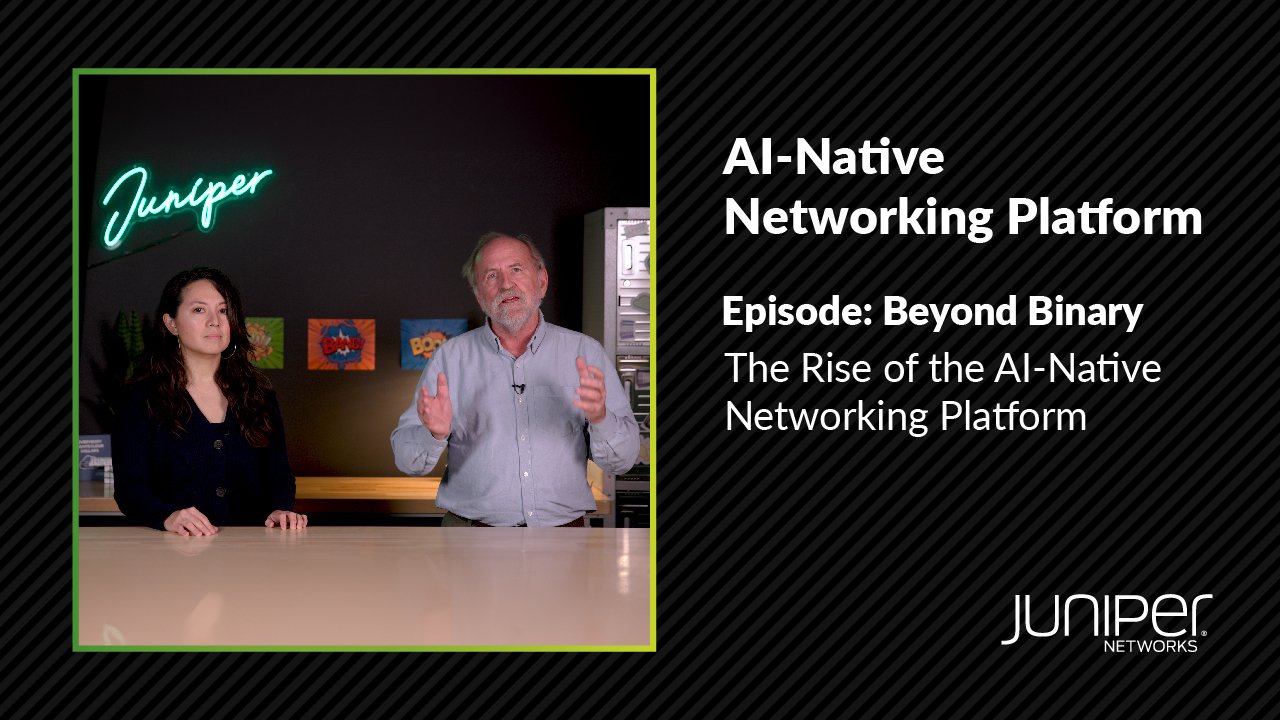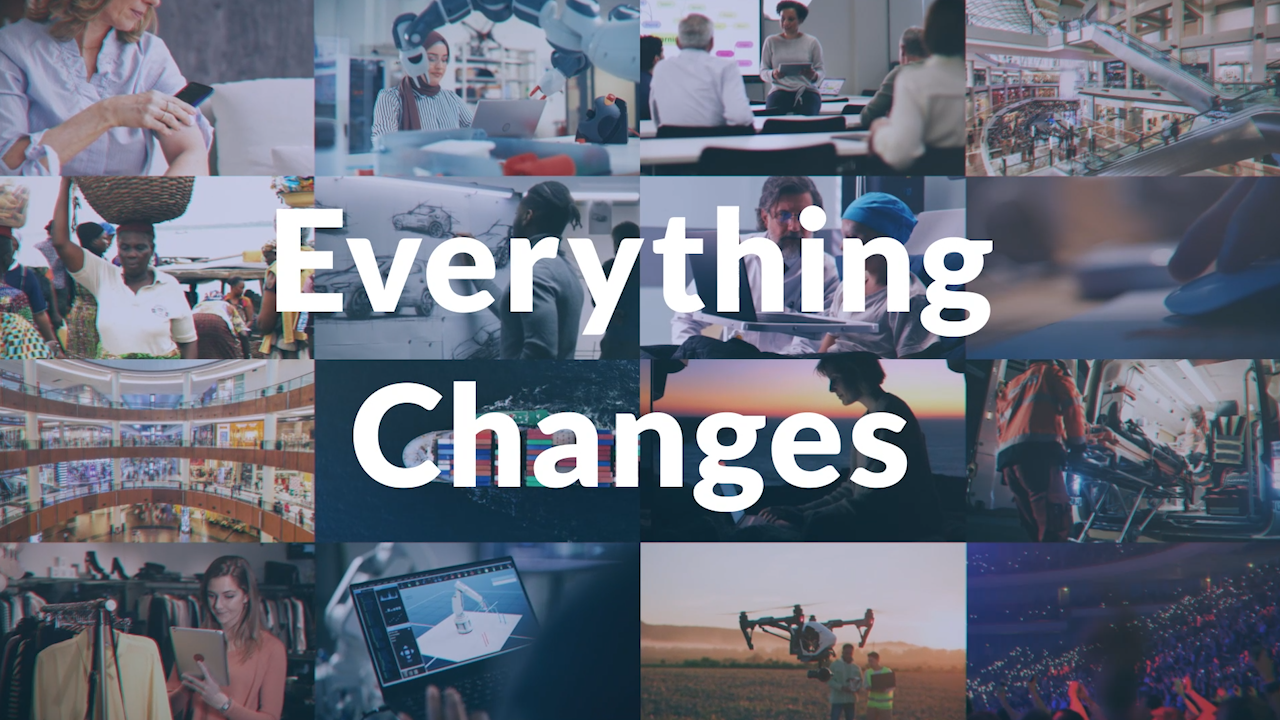Bob Friday Talks: The AI-Native Networking Platform Defined


Bob Friday Talks about the Rise of AI in AI-Native Networking
Juniper Chief AI Officer, Bob Friday, talks about what an AI-Native platform means to network users and operators. First, he explains what AI-Native means – building your AI solution from a real-time, cloud foundation, not retrofitting your legacy solution to work in the cloud. He further explains that to get the right data you have to control the data source and that’s what Juniper does with its AI-Native solution. Hear why Juniper’s AI-Native platform is years ahead of the other solutions.
You’ll learn
The difference between AI-Native and AI-driven and why your only real choice is an AI-Native networking solution
How Marvis Minis take Juniper’s AI-Native solution to a whole new level across all your network domains
Who is this for?
Host

Experience More
Transcript
0:00 hello AI native networking platform has
0:03 been something we've talked about a lot
0:04 lately but what does that mean for your
0:06 user and your operator to help us
0:08 understand it all we have brought in Bob
0:10 Friday our chief AI officer to walk us
0:12 through it all right Bob first question
0:15 what role does AI play in today's
0:17 networks and how is AI able to benefit
0:19 the experience of the end user yeah
0:22 Jessica you know for me I want to relate
0:24 a story from when I started Miss I was
0:26 talking to some very large retail
0:28 customers and what they were telling me
0:30 was Bob before I put any business
0:32 critical app onto this network you have
0:34 to assure me that your controllers are
0:36 not going to crash that you can
0:37 basically release code more than once or
0:39 twice a year and most importantly you
0:42 have to make sure that when that user
0:44 connects that they're going to have a
0:45 great experience right and that's when I
0:48 realized that really the Paradigm was
0:50 shifting from helping customers manage
0:52 Network elements to really helping them
0:54 manage that cloud AI user experience and
0:58 that is the role that AI is playing in
1:00 today's network is really moving from
1:02 that Paradigm of managing Network
1:03 elements to managing the client to Cloud
1:06 user experience all right so what is the
1:08 difference between AI native and AI
1:11 driven that is a great question you know
1:14 my story was at Cisco before I started
1:16 Mist I was talking to some very critical
1:19 big retail customers and they told me a
1:21 couple things one is before they were
1:24 going to put any business critical app
1:25 on that Network like an app for their
1:27 customers they wanted to make sure that
1:29 controllers were not going to crash
1:31 anymore they wanted to make sure that I
1:33 could deliver code more than once or
1:36 twice a year they wanted me to keep up
1:37 with their mobile app and more
1:39 importantly they really wanted to make
1:41 sure before anyone on that Network that
1:44 they were going to have a great
1:45 experience and that was really the
1:48 paradigm shift from managing Network
1:50 elements like I did 20 years ago versus
1:53 managing the unit experience so when you
1:55 look at AI native the decision I made
1:58 was to solve that problem
2:00 I need to leave Cisco and start with a
2:02 clean sheet of paper you know that
2:05 actually building an AI native was going
2:07 to require a real-time Foundation Cloud
2:10 solution that you were not going to get
2:12 at a legacy system and more importantly
2:15 when you put the software on the cloud
2:17 you need to build a microservices
2:19 software architecture which really
2:21 required that blank sheet of paper so
2:23 when you think about AI native and AI
2:25 driven AI native means a clean sheet of
2:28 paper and a Foundation built for
2:31 real-time Cloud AI performance Aid
2:34 driven is basically make taking that
2:36 foundation and then delivering an aid
2:38 driven experience so with AI native I've
2:41 been hearing part of the reason Juniper
2:43 AI is ahead is because it's built on the
2:46 right data the right real-time response
2:49 and the right secure infrastructure so
2:51 can you explain as to what that means
2:53 you know because when I was at Mist the
2:56 reason I built an access point was to
2:58 make sure I could get the right data
3:00 to answer the question of why is a user
3:02 having a poor internet experience it's
3:05 not because I thought the industry
3:06 needed another access point it's because
3:08 I wanted to make sure I could get the
3:09 right data in terms of real-time
3:11 response the other reason I left Cisco
3:14 to start Miss because I knew that we had
3:16 to build a cloud infrastructure a secure
3:18 Cloud infrastructure that really could
3:20 handle data in real time and when you
3:22 look at what the first thing we built
3:24 indor location we were able to take data
3:27 back from the network device and
3:30 actually return a location response in
3:32 one second so that's what we mean by
3:34 realtime data down to second level
3:36 real-time data across a secure Cloud
3:39 infrastructure so Juniper offers the
3:41 only platform with a common
3:43 microservices Cloud why is that
3:45 important for AI and how does that help
3:47 deliver an exceptional user experience
3:50 you know as I mentioned before when I
3:51 was working with large retail customers
3:53 one of the things they asked for was for
3:55 controllers to stop crashing and that is
3:58 really due to the difference the
3:59 software architecture between an on-
4:01 Prim solution and a Cloud solution you
4:04 don't can't simply take software on your
4:06 controller and move it to a container or
4:08 Cloud that does not funly change the
4:10 reliability when we move to these Cloud
4:12 architectures we're moving to a
4:14 microservices architector that we can
4:16 basically download and release every
4:19 other week which brings the speed of
4:20 innovation and on terms of reliability
4:24 these microsurfaces Cloud architectures
4:26 reduce the blast radius over in the
4:28 controller on Prim world we had
4:30 spaghetti coat so we're fundamentally
4:32 changing the software architecture from
4:34 a very spaghetti Cod type environment to
4:37 a much more structured Cloud API
4:39 environment where microservices reduce
4:41 the blast radius and allows the speed of
4:44 innovation all right so Juniper just
4:46 announced two enhancements to Marvis why
4:50 should every Enterprise be leveraging
4:51 Marvis minis technology we're very
4:54 excited about Marvis minis you know up
4:56 to now we've done a great job on the
4:58 pre- connection experience and the post
5:00 connection user experience what Marvis
5:02 minis really allows us to do is to start
5:04 to bring data to Marvis when there are
5:07 no users on your network this will allow
5:09 our customers to make sure that that
5:11 network is ready to go on that first day
5:13 of deployment or when that network is
5:15 ready to go when they open the doors at
5:16 8:00 so marvous minis think of it as a
5:19 synthetic user that's constantly on your
5:22 network constantly making sure your
5:23 network is ready for prime time all
5:26 right so we discussed two enhancements
5:28 talking about the second one Juniper
5:30 extends Marvis to the data center why is
5:33 this integration a game-changing
5:35 Innovation and what real world benefits
5:37 should it leaders expect since joining
5:40 Juniper in 2019 we've been on the
5:42 mission here to extend Cloud Ai and
5:45 Marvis across the Enterprise portfolio
5:47 wireless switch route now we're looking
5:50 to extend Marvis across the different
5:53 business units here and campus branch
5:55 and data center is one of those
5:57 Integrations and why is this important
5:58 to our customer customers because we
6:00 have several customers that run business
6:02 critical apps like point of sale
6:04 boarding pass out of their private Data
6:06 Center and when those critical business
6:08 apps go down they need to quickly figure
6:11 out is it a campus land branch problem
6:14 or is it really just a data center
6:15 problem so by combining both the branch
6:18 and the data center into Marvis now
6:20 we're helping our customer answer
6:21 business critical application
6:23 experiences all right so last tough
6:26 question how does the Personnel change
6:29 when is introduced yeah so you look at
6:31 it departments and how they've evolved
6:33 over the last 20 years we're kind of
6:35 moving from a era of CLI the dashboards
6:40 and now we're moving on to Virtual
6:42 assistance llm and chat GPT so when you
6:45 look at the IT personnel as we start to
6:48 introduce cloud and AI into the mix
6:51 first of all we're starting to see it
6:52 move from clii to becoming python
6:55 programmers right apis are becoming much
6:57 important we're seeing that right now as
6:59 we speak as we move forward we're going
7:02 to start to see llm conversational
7:04 interfaces become much more important
7:06 those it persons and we're going to see
7:08 them start to interact with their
7:09 networks in a much more natural way they
7:11 asked us three years ago to find this
7:13 problem we actually just found it now
7:15 with a new AI model that basically is
7:18 able to predict Zoom user experience and
7:20 what it showed was they basically had a
7:22 misconfigured VPN Gateway that was
7:24 routing traffic from India to Australia
7:28 right and so this is the power of AI is
7:30 helping it Enterprises find those needle
7:34 in the Hast stack problems so this is an
7:36 exciting time to be back into networking
7:38 again and Cloud AI is going to make it
7:39 funner for the next
7:46 decade

























